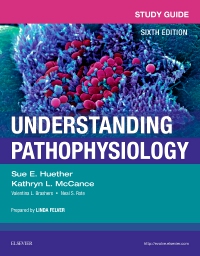
Study Guide for Understanding Pathophysiology Elsevier eBook on VitalSource, 6th Edition
Elsevier eBook on VitalSource

Now $37.99
Get the review and application tools you need to master difficult pathophysiology concepts! Designed to be used with the Understanding Pathophysiology, 6th Edition textbook, this extensively revised study guide utilizes a wide variety of engaging chapter activities, including application-based case scenarios and thousands of interactive questions, to help you easily integrate and apply pathophysiology information to clinical practice. New features of this study guide edition include nearly 30 new case scenarios, Teach These People About Pathophysiology questions, active headings, and more images from the main text. As with previous editions, answers to all questions can be found in the back of the study guide.
Newer Edition Available
Study Guide for Understanding Pathophysiology Elsevier eBook on VitalSource
-
- Close alignment with format of the main text enables users to go back and forth between the resources with ease.
- Answer key found in the back of the study guide offers one place for users to check answers and evaluate progress.
-
- NEW! Over 2,650 interactive questions in a variety of formats are used throughout the study guide to help users truly master and apply high-level pathophysiology content from the main text.
- A wide variety of engaging chapter activities reinforce the application of pathophysiology concepts through: matching definitions, choosing correct words, completing sentences, categorizing clinical examples, explaining pictures, describing differences, and teaching others about pathology.
- NEW! Teach These People about Pathophysiology questions pose questions directly from the patient’s point of view.
- NEW! 30+ case scenarios feature brief cases with short answer style questions to provide real-world examples of how content would be used in the clinical setting.
- NEW! Active headings carry more impact in breaking up question types with language such as "Match these Definitions" instead of "Matching" or "Respond to these Clinical Situations" instead of "Short Answer".
- NEW! Nearly 70 images from the main textbook are incorporated and used in "Explain the Pictures" and "Draw Your Answers" questions to help engage users with visual learning.
-
Frontmatter
Introduction to PathophysiologyPART ONE: BASIC CONCEPTS OF PATHOPHYSIOLOGY
Unit 1: The Cell
1. Cellular Biology
2. Genes and Genetic Diseases
3. Epigenetics and Disease (NEW)
4. Altered Cellular and Tissue Biology
5. Fluids and Electrolytes, Acids and BasesUnit 2: Mechanisms of Self-Defense
6. Innate Immunity: Inflammation and Wound Healing
7. Adaptive Immunity
8. Infection and Defects in Mechanisms of Defense
9. Stress and DiseaseUnit 3: Cellular Proliferation: Cancer
10. Biology of Cancer
11. Cancer Epidemiology
12. Cancer in Children and AdolescentsPART TWO: BODY SYSTEMS AND DISEASES
Unit 4: The Neurologic System
13. Structure and Function of the Neurologic System
14. Pain, Temperature, Sleep, and Sensory Function
15. Alterations in Cognitive Systems, Cerebral Hemodynamics and Motor Function
16. Disorders of the Central and Peripheral Nervous Systems and Neuromuscular Junction
17. Alterations of Neurologic Function in ChildrenUnit 5: The Endocrine System
18. Mechanisms of Hormonal Regulation
19. Alterations of Hormonal RegulationUnit 6: The Hematologic System
20. Structure and Function of the Hematologic System
21. Alterations in Hematologic Function
22. Alterations of Hematologic Function in ChildrenUnit 7: The Cardiovascular and Lymphatic Systems
23. Structure and Function of the Cardiovascular and Lymphatic Systems
24. Alterations of Cardiovascular Function
25. Alterations of Cardiovascular Function in ChildrenUnit 8: The Pulmonary System
26. Structure and Function of the Pulmonary System
27. Alterations of Pulmonary Function
28. Alterations of Pulmonary Function in ChildrenUnit 9: The Renal and Urologic Systems
29. Structure and Function of the Renal and Urologic Systems
30. Alterations of Renal and Urinary Tract Function
31. Alterations of Renal and Urinary Tract Function in ChildrenUnit 10: The Reproductive Systems
32. Structure and Function of the Reproductive Systems
33. Alterations of the Female Reproductive System
34. Alterations of the Male Reproductive SystemUnit 11: The Digestive System
35. Structure and Function of the Digestive System
36. Alterations of Digestive Function
37. Alterations in Digestive Function in ChildrenUnit 12: The Musculoskeletal and Integumentary Systems
38. Structure and Function of the Musculoskeletal System
39. Alterations of Musculoskeletal Function
40. Alterations of Musculoskeletal Function in Children
41. Structure, Function, and Disorders of the Integument
42. Alterations of the Integument in ChildrenAnswer Key


 as described in our
as described in our 